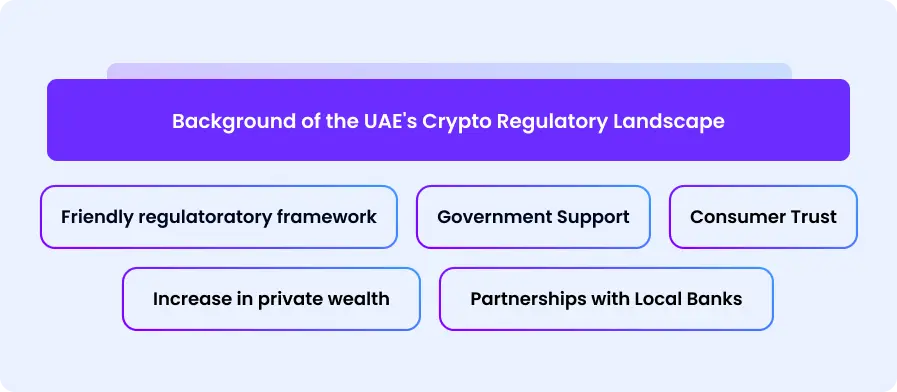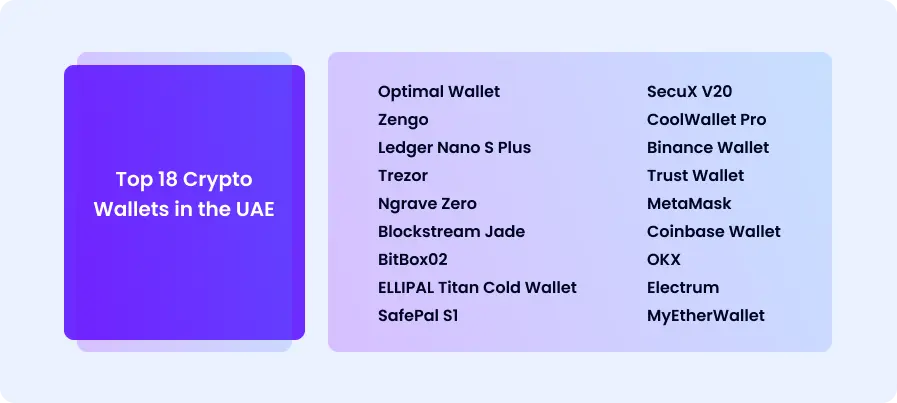Crypto for Countries: UAE
In recent years, the Middle East's financial services sector has expanded dramatically. Dubai, with its numerous policies supporting blockchain technology, is emerging as one of the best markets for cryptocurrency trading, while the UAE as a whole is leading the world in promoting widespread adoption of cryptocurrencies outside the financial sector.
With the government's industry-friendly regulatory policies taking shape, digital currency is rapidly gaining traction in a variety of sectors, including telecom and gaming.
If you've ever wondered what's driving the rise in virtual assets in the United Arab Emirates, or if you're looking for opportunities in the crypto industry in Dubai, this is for you. In this article, we will look at the UAE's crypto ecosystem, the top crypto wallets in the region, and the relationship between Dubai and cryptocurrency.
According to Chainalysis, the Middle East is one of the world's fastest growing cryptocurrency markets, accounting for 7% of total trading volumes. Furthermore, according to the Consumer News and Business Channel (CNBC), the UAE's share of the global market is approximately $25 billion in transactions. This figure is expected to increase by 7.89% to a market value of US$395.8 million by 2028.
Background of the UAE's Crypto Regulatory Landscape
The UAE aims to attract crypto firms and grow its domestic industry. They regulate the crypto sector rather than restricting it. Some important drivers of growth in the UAE are listed below.
Friendly regulatoratory framework.
According to Reuters, a favourable regulatory environment is driving growth, with over 30 licences issued for crypto exchanges to operate in Dubai and Abu Dhabi.
Government Support.
To expand the use of crypto assets, the Dubai Multi Commodities Centre (DMCC) established a new crypto centre for companies developing various crypto and blockchain technologies.
The DMCC houses companies that offer, issue, list, and trade crypto assets, as well as those developing blockchain trading platforms, and is fully supported by the national government.
Increase in private wealth.
Between 2019 and 2021, private wealth increased by US$46 billion, with 5,600 millionaires moving to the UAE, according to Henley's Global Citizen's Report Q1 2022.
Increased private wealth has a cascading effect on investment. According to a Goldman Sachs survey, approximately 15% of global family offices already have some level of exposure to cryptocurrency. A little more than half of the families said they were thinking about investing in cryptocurrency.
Furthermore, because many of these wealthy individuals have already amassed their wealth in cryptocurrency through apps, they are now looking to transition to VIP services provided by major crypto exchanges, putting additional demand pressure on wealth managers. This promotes the institutionalisation of virtual assets.
Consumer Trust.
UAE consumers appear to have a healthy appetite and trust in cryptocurrency.According to a YouGov Survey, "two-thirds of UAE residents (67%) say they are interested in investing in crypto in the next five years," and the UAE is one of the top markets in the world where consumers trust cryptocurrencies.
Partnerships with Local Banks.
On July 18, 2022, Rakbank partnered with Kraken, a local bank, to allow residents to fund their crypto accounts using local transfers from any bank in the country. This integration with mainstream financial services provided by local banks increases user adoption and market growth.

Dubai and Cryptocurrencies
Dubai has two main laws governing cryptocurrency usage: the Virtual Assets Licence (VAL) and the Virtual Assets Regulatory Authority (VARA). They both imposed regulations on virtual assets in the city.
On February 28, 2022, Dubai passed VAL, its first crypto law, which aims to protect investors and regulate digital currencies. VARA, on the other hand, governs the sale of virtual assets and tokens, authorises service providers, and safeguards investor data.
VARA is an independent regulator in Dubai responsible for the regulation, governance, and licencing of cryptocurrencies, non-fungible tokens (NFTs), and other virtual assets.
VARA aims to promote collaboration among global Virtual Asset Service Providers (VASPs), industry leaders, and regulatory authorities.
Students in Dubai can pay for their education using cryptocurrency, which is an innovative method. To set the precedent, students at Citizens School can use this method as part of a civic programme. Since September 2022, an e-currency platform has enabled seamless cryptocurrency payments by automatically converting cryptocurrencies to dirhams (AED). The implementation of this innovative payment system prepares the country's youth for the new digital ecosystem.
Furthermore, in 2022, Bybit and AUS collaborated to promote cryptocurrency use and educate people on blockchain. The partnership provides scholarships and hackathon opportunities to equip students with the skills they need to understand how the crypto industry works. Bybit, the third-largest cryptocurrency exchange, has contributed AED 1,000,000 to the scholarship. The scholarship aims to help 20 students pursue careers in blockchain and fintech.
Additionally, Dubai now has over 772 crypto companies, attracting attention from major players such as crypto.com, Binance, and Deribit.
Top 18 Crypto Wallets in the UAE
According to Techopedia, the following are the top 18 wallets in the UAE for 2024.
1. Optimal Wallet: Offering non-custodial services alongside robust security measures, an AI chatbot feature, and the option for rewards staking.
2. Zengo: Provides self-custody solutions with compatibility for over 120 cryptocurrencies, NFTs, and access to a dApp marketplace.
3. Ledger Nano S Plus: Renowned as a premier hardware wallet, ideal for exposure to markets and participation in DeFi activities.
4. Trezor: Ensures offline storage of private keys with added transaction privacy through Coinjoin functionality.
5. Ngrave Zero: Distinguished by its premium hardware design and military-grade security features.
6. Blockstream Jade: Specializes in Bitcoin transactions, utilizing multisig technology for enhanced security.
7. BitBox02: Crafted in Switzerland, this hardware wallet boasts direct USB connectivity for added convenience and security.
8. ELLIPAL Titan Cold Wallet: Recognized as one of the safest cold wallets, featuring air-gapped signing mechanisms.
9. SafePal S1: Offers an affordable hardware wallet solution, supporting a vast array of cryptocurrencies.
10. SecuX V20: Features a user-friendly color touchscreen interface, Bluetooth connectivity, and ChainSafer functionality.
11. CoolWallet Pro: Compact and sleek, resembling a credit card in size, equipped with Bluetooth connectivity and a durable battery.
12. Binance Wallet: Provides access to a wide range of cryptocurrencies via the exchange's web and mobile platforms.
13. Trust Wallet: A non-custodial option tailored for decentralized marketplaces and earning interest on assets.
14. MetaMask: Available as a browser extension and mobile app, designed for Ethereum and Binance Smart Chain transactions.
15. Coinbase Wallet: A decentralized wallet app catering to thousands of cryptocurrency assets.
16. OKX: A decentralized wallet app serving as an exchange aggregator, supporting over 50 blockchain standards.
17. Electrum: A desktop wallet offering advanced security features for Bitcoin storage.
18. MyEtherWallet: A browser extension and application designed for storing ERC20 tokens and participating in Ethereum 2.0 staking.

Final Thoughts
The UAE Central Bank does not recognise cryptocurrencies as official currency. However, the country is encouraging the use of digital assets and implementing new strategies to boost the economy. However, there are always risks associated with blockchain technology.
FAQs
Q1. How does the UAE position itself in the global cryptocurrency market?
The UAE has established itself as a key player by creating a favourable regulatory environment, attracting significant private wealth, fostering consumer trust, forming partnerships with local banks, and promoting crypto-friendly initiatives.
Q2. What are the main regulations governing virtual assets in Dubai?
The Virtual Assets Licence (VAL) provides investor protection and oversight, while the Virtual Assets Regulatory Authority (VARA) regulates virtual asset sales, authorises providers, and protects investor data.
Q3. What initiatives are being implemented to attract foreign investors and entrepreneurs to the UAE's digital asset industry?
The initiatives include maintaining a friendly regulatory regime, issuing licences for crypto exchanges, establishing the DMCC as a hub, collaborating with local banks for seamless funding, promoting consumer trust, and supporting educational initiatives such as scholarships and hackathons.
Our solutions are ready to work in any regulation, we also offer licensing advice to our clients.
Contact us


